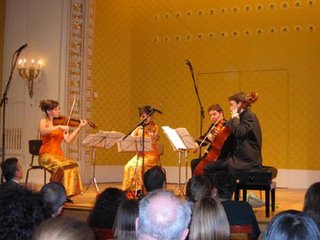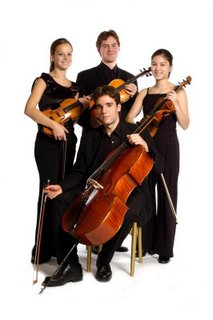Mozart's Birthday - but a Minetti Quartet(t) Celebration
 If, after this week, we have passed the peak of the Mozart inundation/bonanza, it wasn’t half as painful as we thought it might be. Really, it wasn’t painful at all. Sure, there were a few concerts where an unseasonably lot of WAM showed up, but those were mostly minor events we would not have felt guilty skipping one way or the other. The NSO performing a semi-staged Mozart opera would have been a good idea in any given year – and with one lonely La Clemenza di Tito sticking out of the miniscule National Opera’s season, you couldn’t tell that anything special was going on in 2006. When Mitsuko Uchida played all Mozart at Strathmore it was still 2005, unrelated to the Mozart hoopla, and great! When Brendel will squeeze the Mozart Fantasia in C minor, K. 475, and the Rondo in A minor, K. 511, into his recital at the Kennedy Center on February 7th, we would have expected him to do so, anyway.
If, after this week, we have passed the peak of the Mozart inundation/bonanza, it wasn’t half as painful as we thought it might be. Really, it wasn’t painful at all. Sure, there were a few concerts where an unseasonably lot of WAM showed up, but those were mostly minor events we would not have felt guilty skipping one way or the other. The NSO performing a semi-staged Mozart opera would have been a good idea in any given year – and with one lonely La Clemenza di Tito sticking out of the miniscule National Opera’s season, you couldn’t tell that anything special was going on in 2006. When Mitsuko Uchida played all Mozart at Strathmore it was still 2005, unrelated to the Mozart hoopla, and great! When Brendel will squeeze the Mozart Fantasia in C minor, K. 475, and the Rondo in A minor, K. 511, into his recital at the Kennedy Center on February 7th, we would have expected him to do so, anyway.All that inconspicuous Mozart left the two-concert Mozart celebration at the Austrian Embassy (presented by the Embassy Series) one of the more notable Mozart-at-250 events. It featured the young Austrian Minetti Quartett… and even they dedicated only a part of their play-time to Mozart, the lion's share of the program going to Schubert. Two early, Sammartini-influenced quartets, K. 156 (134b) and K. 157, came first. They are neither the greatest of his works nor gems among his quartets, they show no influence of the already written and published quartets of Haydn, but they are improvements over the ‘Divertimenti’ Quartets that came a year earlier, in 1772. But what they positively bring to an evening of Mozart celebration is carefree beauty and boundless joy that isn’t reined in by the determination to make a great gesture or profound statement full of looming ‘meaning’.
 For those reasons it is all the better to hear the 17-year-old composer’s work played with unburdened freshness, by a quartet that is nearer to him in age than would be most. Instead of killing the works with undue polish, the Minetti Quartett worked their way through them with just the right amount of a light touch. Lest anyone think that “without undue polish” is code for “flawed and out of tune” (for which it usually is code), these four musicians who, as a quartet, have already established themselves in Austria as ‘the next big thing’, were as flawless as desirable in a live performance. Their exhaustion from a long trip and limited time to practice were not noticeable to the ear. Even hearing them in minor works, one is inclined to take out shares on their future stardom. One thing that struck in particular – or rather: what remarkably didn’t strike me – was that no one player stood out of this group as a superior or lesser member. I’ve heard plenty of young string quartets in the last few years and usually you can hear pretty quickly that the viola is perhaps above and beyond the rest or that the second violinist doesn’t match the first. Not so here. Maria Ehmer (first violin), Anna Knopp (second violin), Markus Huber (viola), and Leonhard Roczek (cello) played as a collective, counted supreme balancing among their assets, and succeeded not on individual ability (though plenty endowed in that field, too) but as a group.
For those reasons it is all the better to hear the 17-year-old composer’s work played with unburdened freshness, by a quartet that is nearer to him in age than would be most. Instead of killing the works with undue polish, the Minetti Quartett worked their way through them with just the right amount of a light touch. Lest anyone think that “without undue polish” is code for “flawed and out of tune” (for which it usually is code), these four musicians who, as a quartet, have already established themselves in Austria as ‘the next big thing’, were as flawless as desirable in a live performance. Their exhaustion from a long trip and limited time to practice were not noticeable to the ear. Even hearing them in minor works, one is inclined to take out shares on their future stardom. One thing that struck in particular – or rather: what remarkably didn’t strike me – was that no one player stood out of this group as a superior or lesser member. I’ve heard plenty of young string quartets in the last few years and usually you can hear pretty quickly that the viola is perhaps above and beyond the rest or that the second violinist doesn’t match the first. Not so here. Maria Ehmer (first violin), Anna Knopp (second violin), Markus Huber (viola), and Leonhard Roczek (cello) played as a collective, counted supreme balancing among their assets, and succeeded not on individual ability (though plenty endowed in that field, too) but as a group.The E-flat major String Quartet, D87 (formerly known as quartet no. 10, op. 125, #1) of Schubert continues the Mozart’s level of classical beauty, here touched up with a Romantic and denser feel. Lovely it is and surprisingly mature – only the Andante might have done well in a tighter version. The finale (Allegro) seemed just made for rummaging around in like four puppies, which is what the Minetti Quartett did… if with fleet fingers rather than big paws.
F.Schubert, Complete Songs, G.Johnson et al. Hyperion UK | DE | FR |
F.Schubert, Songs of Death, B. Fassbänder / G. Johnson Hyperion UK | DE | FR |
Music Reviews: Minetti String Quartet (Washington Post, January 30) |
Addendum: The Minetti Quartet would go on to record a superb, absolutely joyous Haydn disc.





















































